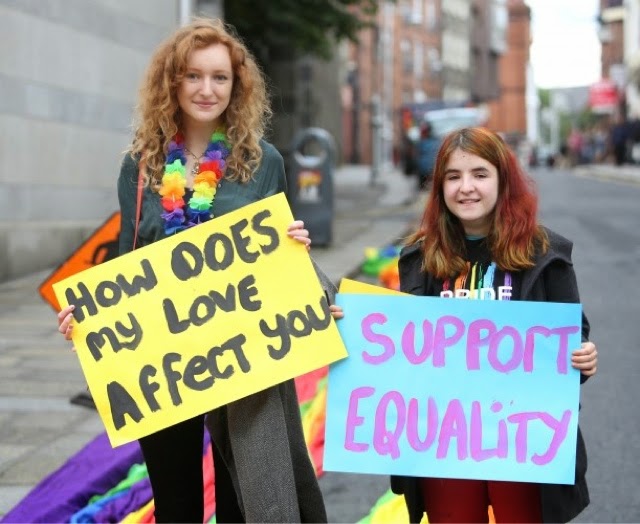Today is a historic day for the LGBT community in Britain and Ireland. Firstly, in my homecity, the annual Gay Pride parade is in full swing. Secondly, tonight is Eurovision - if you are a reader from outside of the EU, and you are not familiar with Eurovision, it is pretty much like a gigantic, continent-wide party that you don't actually have to put any trousers on to participate in. Throughout Eurovision history, and particularly over the past few years, it has been very much a pro-equality platform, aired on the BBC in the UK and on other major European television channels. Last year's winner, Austrian Conchita Wurst, is a member of the LGBT community, and her win was definitely a two-finger salute to Russian President Vladimir Putin's anti-homosexuality laws and discrimination. But the most important reason as to why today is historic is due to the result of the Irish referendum regarding the issue of marriage rights for same-sex couples. Ireland is now the first nation to leave the decision to its electorate, however, it is hard to believe that it has taken until 2015 for people to accept marriage as a basic right for all, in a way that is not exclusionary of anyone regardless of their sexuality. The Republic of Ireland has fallen victim to a battle between conservatism and liberalism, particularly in the build up to the referendum. Although the results have not yet been formally announced, the 'Yes' campaign is said to have pretty much a clean sweep, which clearly implies considerable change from a country whose law against homosexual acts still stood until just 22 years ago. Fine-Gael, the majority party in Ireland's political coalition, has been flying rainbow flags outside their Dublin offices, and in Birmingham - my hometown, where much of the population are either Irish migrants themselves or children of them - the Digbeth area and the city's Irish pubs are doing the same.
One of the most promising aspects of yesterday's referendum is the fact that many Catholics are professing their beliefs in equality for all. Because of this, I have been given hope for a future change of face to the religion I was bought up in, but felt I could no longer identify to due to the general attitude towards women, other religions and the LGBT community. Despite the fact that the Catechism of the Catholic Church states that homosexuality itself is not a sin, it does make clear it's ideas regarding acting upon homosexual urges - that this is sinful. However, as a Catholic country, it seems that the Republic of Ireland has begun to sway towards the liberal end of the spectrum, which makes me very optimistic for the future.
Congratulations to all members of the Irish LGBT community, who are now one step closer to gaining equality within society. The battle is not over yet, but with the referendum being overwhelmingly in favour of gay rights, hopefully this is a sign of immense support in any future endeavours. Today I am proud to associate myself with my Irish heritage more so than ever.

